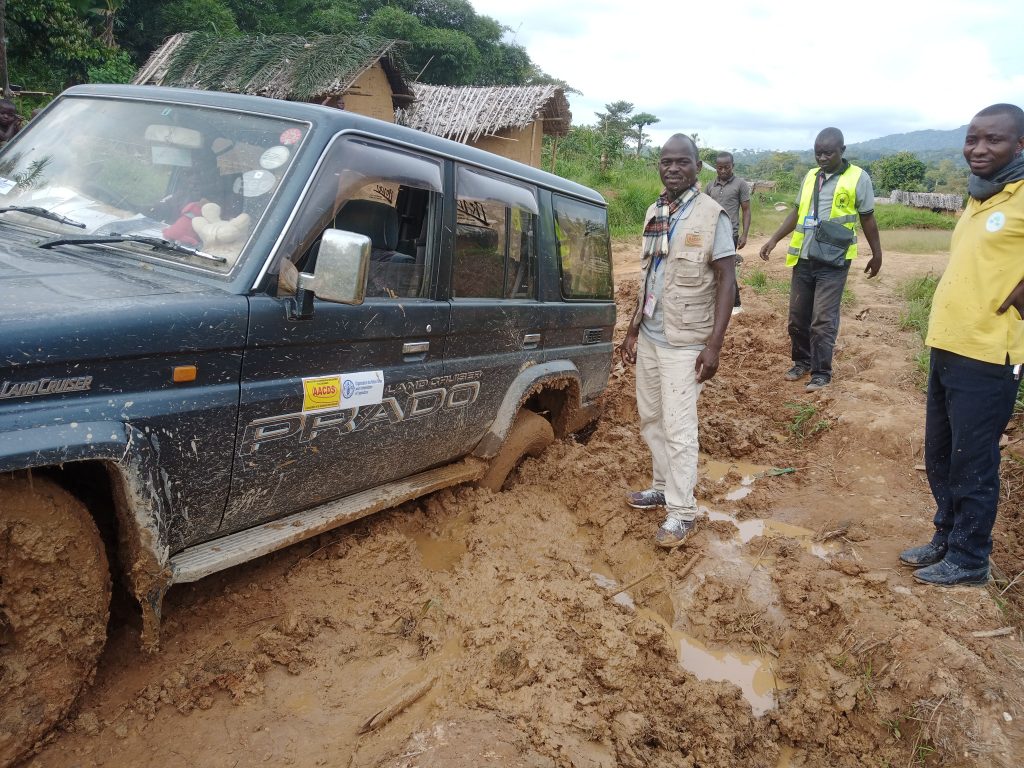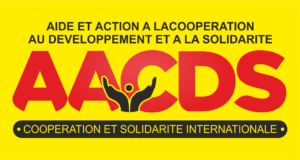
Rapid response to the protection of children and women affected by the M23 armed conflicts in Nyiragongo Territory
This project aims to consolidate the framework for prevention and response to situations of violence, abuse and exploitation of children and women in emergency situations of armed conflict between the FARDC and the M23 rebellion in the Nyiragongo area in Nyiragongo Territory.
This project proposes to:
- To facilitate the transition of children affected by armed conflict and displacement (EAFGA and ENA/S) to a normal life in emergency situations, through the provision of transitional care, referral and tracing/family reunification, temporary supervision, clothing assistance, nutritional care and socio-economic reintegration through assistance to 150 families of children;
- Organize a distribution of Essential Household Items (EHI) to displaced households (clothes for women and children);
- Establish/strengthen the capacity of Child Friendly Spaces (CFS) to monitor, report, prevent and refer cases of child abuse/child rights violations for access to response;
- Implement a low-cost community-based child and women's protection awareness strategy, particularly to prevent, identify and refer cases of violence, abuse and exploitation in IDP sites.
This project directly targets 200 children (70 girls, 130 boys and 450 women) affected by armed conflict to be reached through reception, transitional care, referral, nutritional care, family reunification and socio-economic reintegration. These children are distributed as follows:
- 50 children associated with the Armed Forces and Groups (20 girls and 30 boys);
- 150 unaccompanied or separated children (50 girls and 100 boys);
- 450 Displaced and vulnerable women.
The prevention aspects will involve building community capacity in the early warning system and improving Monitoring (MRM: Monitoring of Major Violations) in IDP sites and in areas affected by the M23 crisis. The response component will use traditional approaches to care. Women and unaccompanied/separated children will benefit from identification, verification, documentation, transitional care and/or referral to other care facilities, tracing/mediation and family reunification, post-reunification monitoring, and socio-economic reintegration support.
Since the beginning of the crisis, AACDS has already focused its interventions in Nyiragongo Territory, particularly in the Nyiragongo health zone, in terms of sensitization of the displaced in relation to protection, awareness, detraumatization, distribution of porridge to children and pregnant and lactating women by organizing community sensitization sessions in the sites of the displaced.
The financial support of the Codespa Foundation will reinforce the current capacities of AACDS in the area and alleviate the misery of the displaced, particularly children who are most affected in the sites following the clashes between FARDC and the M23 rebellion in the Nyiragongo and Rutshuru Territory. This is a complementary support to the ongoing response in the area, and will support the continuity of psychosocial support actions for children and women affected by the conflicts by expanding the intervention capacities in the area of other actors present in the area and of the partner AACDS.
The intervention strategy of this project is part of an integrated approach with other clusters and the Congolese government in responding to the crisis related to the clashes between FARDC and the M23 rebellion (a rebellion supported by Rwanda) through an emergency response to the chronic needs of displaced persons, particularly children and women in the forefront.
See the presentation material
- Intervention theme
-
- Education
- Protection
- Area of intervention
-
- Other (please specify)
- Democratic Republic of Congo
- Skills required
-
- Search for funding
- Type of partnership
-
- Sponsorship
- Service/Customer
- Financing
- In search of funding
- Project title
The title of the project is "Rapid Response to the Protection of Children and Women Affected by the M23 Armed Conflict in Nyiragongo Territory.
- Areas of intervention of the project
The project will be implemented in the Democratic Republic of Congo, DRC, North Kivu Province, Nyiragongo Territory, in the Nyiragongo health zone.
- Project target group
The priority group targeted in this project will be children and adolescents and displaced women living in the IDP sites of Kibati, Kanyaruchinya, Mujoga including unaccompanied children (UACs) and very vulnerable displaced women in the IDP sites.
- Duration of the project
3 months of implementation after signature by project stakeholders
- Number of beneficiaries
| Men | Women | Boys | Girls | TOTAL |
| 450 | 130 | 70 | 600 |
This project provides an emergency response to child and women's protection issues in a way that complements ongoing interventions in the area by
- Holistic and community-based care for unaccompanied children from armed groups;
- The establishment/strengthening of community child protection structures in IDP sites;
- The implementation of a community-based sensitization strategy against the recruitment and use/exploitation of children.
- Project objectives.
To increase their chances of survival and to ensure that their rights are respected, displaced persons, especially women and children, need to be assisted through an emergency response. In their displacement, they need to be welcomed, cared for holistically (medical, food, clothing, psychological), reunited with their families and supported socio-economically. The most vulnerable women also have the same needs as the ENA/ES. Within this category, those aged 6-17 also need support for socio-economic reintegration and an emergency response through support to their families.
These needs are identified in various assessment reports from different actors in the field conducted from October 20, 2022. We cite here the various information bulletins published by the Protection Cluster, OCHA and other coordination mechanisms in the province of North Kivu) and field survey and direct observation missions.
The objective of this project is to consolidate the framework for prevention and response to situations of violence, abuse and exploitation of children and women in emergency situations of armed conflict between the FARDC and the M23 rebellion in the Nyiragongo area in the Nyiragongo Territory
- Expected results of the project
- 200 new cases of unaccompanied/separated children (UAS) are transitioning from vulnerability to normal life and their documentation, transitional care, family reunification, and clothing assistance are being provided in the three IDP sites;
- The capacities of local leaders and site managers and other key persons to identify, prevent and respond to child and women protection issues are strengthened in the three IDP sites;
- 450 displaced people from these three sites received emergency clothing assistance;
- 200 children Displaced children aged 0-17 from these three IDP sites received emergency clothing assistance;
- Children aged 0 to 17 living in IDP sites and supervised in Child Friendly Spaces receive emergency assistance;
- Within three months, community-based child protection practices are strengthened, including the prevention, identification, and referral of cases of violence, abuse, and exploitation in the three IDP sites;
- Community and IDP site mobilization for the protection of children and other vulnerable groups is ensured through the organization of 40 door-to-door sensitization and information sessions, 18 focus groups with IDPs and 15 radio programs on child and women protection and conflict prevention and new cases of protection in the IDP sites of Kibati, Mujoga and Kanyarushinya ;
- Vulnerable children and women in humanitarian contexts, in particular EAFGA, ENA/ES, women and children survivors of sexual and gender-based violence, are identified and benefit from a child and woman protection intervention package in emergencies;
- 126 sessions of recreational activities for 200 children in the project target area are organized;
- 5 psychologists and 15 psycho-social assistants are trained in the specific techniques of the community approach in the psycho-social accompaniment of survivors of sexual violence in the indicated IDP sites (Kibati, Mujoga, Kanyarushinya, ...)
- Occupational activities for children and adolescent survivors of violence and other vulnerable displaced children are organized in the three intervention sites;
- Individual counseling for 50 adolescent children is organized;
- 150 members/families affected by the crisis are supported in the means of subsistence through vocational training (socio-professional reintegration);
- Children participating in the Child Friendly Spaces and pregnant and lactating women are taken care of through the distribution of porridges in the three sites.
- Description of the activities to be carried out
- Implementation of ITDR systems (identification, family tracing, reunification, etc.) for ENA/S in areas affected by the crisis related to the clashes between FARDC and the M23 rebel group:
- Identify/document ANEs (possibly through listening points set up in IDP sites);
- Organize the reception and holistic care of ENA/S through the transitional centers of other partners and ensure the documentation and individual follow-up of each child;
- Conducting Family Research/Mediations for ENA/S;
- Arrange family reunifications for cases with positive tracings;
- Organize individual follow-up of reunified children in their families/communities.
- Build the capacity of at least 3 AIS, 3 children's clubs, as well as local leaders, and 3 IDP committees.
- Train the AIS committees, IDP committees/Children's Clubs on the Rights and Protection of the Child in Situations of Armed Conflict; Provide material support and construction of child friendly spaces (CFS);
- Collect/document information/allegations of human rights violations;
- Identify/document cases of other vulnerable or at-risk children (SGBV, children outside the school system...); Refer these cases to the appropriate care structures available (listening center, health, justice, NGOs...)
- Ensure the distribution of clothing kits to children (disaggregated by sex and age) and vulnerable displaced women in the sites of Mujoga, Kibati and Kanyarushinya;
- Organize 40 door-to-door sensitization and information sessions, 18 focus groups with IDPs and 15 radio programs on child and women protection and on conflict prevention and new protection cases in the IDP sites of Kibati, Mujoga and Kanyarushinya;
- Organize 2 days of evaluation of the activities to measure the progress made and self care of the field actors;
- Vulnerable children and women in humanitarian contexts, in particular EAFGA, ENA/ES, women and children survivors of sexual and gender-based violence, are identified and benefit from a child and woman protection intervention package in emergencies.




Are you interested in this project?
Contact AACDS-Aide et Action à la Coopération au Développement et à la Solidarité
to obtain contact information
You need to be logged in to request a match.
New to Coexist?







